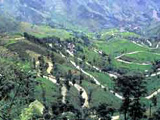 he Chinese idiom "Yelang zi da," referring to the conceit of the king of Yelang, is widely used by Chinese to comment on someone's ridiculous arrogance, but much about its origin is not so well known.
he Chinese idiom "Yelang zi da," referring to the conceit of the king of Yelang, is widely used by Chinese to comment on someone's ridiculous arrogance, but much about its origin is not so well known.
The only thing really known about Yelang is that it was an ethnic minority kingdom in southwestern China in modern-day Sichuan, Yunnan, and Guizhou provinces and the Guangxi Zhuang Autonomous Region.
The kingdom, which originated in as early as the Warring States Period (475 BC-221 BC), prospered during the early Western Han Dynasty (206 BC-AD 24), but vanished mysteriously in the middle of the dynasty, leaving few records.
Duyun City of Guizhou Province, southwest China, was once a town of great military importance in the ancient Yelang kingdom for its unique geographical position.
Some 170 kilometers southwest to Guiyang, capital of Guizhou, Duyun lies on the intersection of the Yunnan-Guizhou Plateau, one of China's most resource-rich areas, and south China, which brings many business opportunities to the city today.
In 2001, an expressway from Chengdu, capital of neighboring Sichuan Province, to Beihai, a coastal city of the Guangxi Zhuang Autonomous Region, was opened to traffic. The expressway, which cuts through Duyun, is the only modern passage for inland southwest China areas to reach the sea.
"Since the expressway project started in 1998, many enterprises from Guangdong, Sichuan and Zhejiang provinces and the Guangxi Zhuang Autonomous Region have come Duyun to invest in real estate and logistics business," said Zhou Jiankun, secretary of the Duyun City Committee of the Communist Party of China.
"During the last four years, the city's gross domestic product (GDP) and the government's fiscal revenue have kept growing at a two-digit rate," Zhou said.
With its rapid economic development, the city government has never forgotten to protect the environment and has made great efforts to keep the original appearance of the 1,000-year-old city.
The city government has invested heavily in afforestation projects, and the forest coverage rate of the city has reached 39.3 percent. The 270 rivers and 100 bridges running across the 2,274-square kilometer land of the city, which have given it a reputation as "Venice on plateau," are all clean.
With a population of about 480,000, Duyun has 33 ethnic groups, including the Bouyei, Miao, Shui and Han. Ethnic minorities account for 65.6 percent of the total population. They still keep their traditional living habits, such as bullfighting, which attracts streams of visitors from both at home and abroad.
As a means to boost tourism, the local government has registered with the industry and commerce administration the trademark of West China Bullfighting City.
(Xinhua News Agency April 23, 2003)
|

